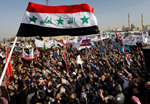 AFP: On a Sunday evening in March, gunmen walked into the offices of a prominent lawyer in the Iraqi capital, opened fire and left him for dead. A friend discovered his body a short time later. By Salam Faraj
AFP: On a Sunday evening in March, gunmen walked into the offices of a prominent lawyer in the Iraqi capital, opened fire and left him for dead. A friend discovered his body a short time later. By Salam Faraj
 BAGHDAD (AFP) — On a Sunday evening in March, gunmen walked into the offices of a prominent lawyer in the Iraqi capital, opened fire and left him for dead. A friend discovered his body a short time later.
BAGHDAD (AFP) — On a Sunday evening in March, gunmen walked into the offices of a prominent lawyer in the Iraqi capital, opened fire and left him for dead. A friend discovered his body a short time later.
Security forces flooded the scene, cordoning off the area and telling passers-by that all they knew was that a lawyer had been killed.
It was not until hours later that the apparent motive for the murder became clear. Salah al-Obeidi, 48, had been standing in provincial elections, one of 11 candidates to have been killed so far in the lead-up to the April 20 polls.
“The motive for the crime was political,” said Hamid, a cousin of Obeidi’s who attended the funeral commemorations days later in the same Saidiyah neighbourhood where the father of seven was gunned down.
“He was killed because he was standing in the elections.”
As he spoke, other relatives and friends sat in stony silence in the Obeidi family’s reception room, the only sound that of children crying in an adjoining room.
Obeidi was the last survivor of four brothers. Two died in the 1980-88 Iraq-Iran war, another was executed by ex-dictator Saddam Hussein, and he had been working for the secular, mostly Sunni-backed, Iraqiya list headed by former prime minister Iyad Allawi.
His death has contributed to growing mistrust between Iraq’s Sunni community and the Shiite-led authorities. All 11 candidates killed have been Sunni, six of them Iraqiya members, fostering a belief that the security forces pay less attention to protecting Sunnis.
Provinces in Iraq’s north and west, all predominantly Sunni, have already been roiled by months of protests, the minority community alleging that it is disproportionately targeted by anti-terror laws and rules barring those with links to Saddam’s regime from participating in public life.
And at the highest levels of government, Prime Minister Nuri al-Maliki, who is Shiite, is locked in a long-running spat with his erstwhile government partners, particularly members of Iraqiya who charge him with consolidating control of the security forces and marginalising Sunnis.
“The security forces are responsible for his death,” said Tahsin Mohammed, one of Obeidi’s nephews, pausing to puff on a cigarette. “They are responsible for protecting him, just like they are for protecting the other Iraqis who are killed every day.”
Taha, a central bank employee and friend of Obeidi, added: “The targeting of Iraqiya candidates is a clear sign — to target the list, to stand in the way of its work, and to hamper its success in the election.”
Another mourner, fellow lawyer and Iraqiya member Abdulkarim al-Juburi, all but accused soldiers and police of complicity in the killing.
“How did they reach there, with silenced weapons, under the noses of the security forces?” he argued.
Once one of Baghdad’s most violent areas, Saidiyah is still heavily fortified. There are blast walls throughout the neighbourhood, and security forces funnel traffic entering the area through a few main routes, often demanding to see proof of residence in Saidiyah before allowing people to pass.
Citing violence against candidates and election officials, the cabinet has postponed the polls for up to six months in Anbar and Nineveh, two of the country’s largest Sunni-majority provinces, drawing the ire of diplomats.
“The fact is that while security has been put forward as a rationale for that postponement, no country knows more about voting under difficult circumstances than Iraq,” US Secretary of State John Kerry said on a surprise visit to Baghdad in March.
Kerry called on Maliki to revisit the decision, which the government did, only to reconfirm it.
Speaking on condition of anonymity, a US diplomat said: “This risks depriving voters of an opportunity to effect peaceful change at the ballot box, and in a part of the country that is experiencing ongoing political tensions and protests.”
Iraq has held several elections since the 2003 invasion that ousted Saddam, most recently parliamentary polls in March 2010, and though it has seen violence against candidates, attacks have never forced the postponement of polls or derailed a vote.
Election officials have insisted they are capable of holding the polls nationwide, but acknowledge the high level of attacks, which Independent High Electoral Commission (IHEC) chief Sarbat Rashid has attributed to “political reasons”.
Iraqiya, meanwhile, has said in a statement it believes it is being targeted in an “intentional and systematic” fashion, and many who once held high hopes for Obeidi are now crestfallen.
“If he continued in politics,” said septuagenarian Abu Sarmad, a mourner at Obeidi’s funeral who was dressed in the dishdasha or traditional Arab full-length robe, “we thought that Salah would become prime minister one day.”


